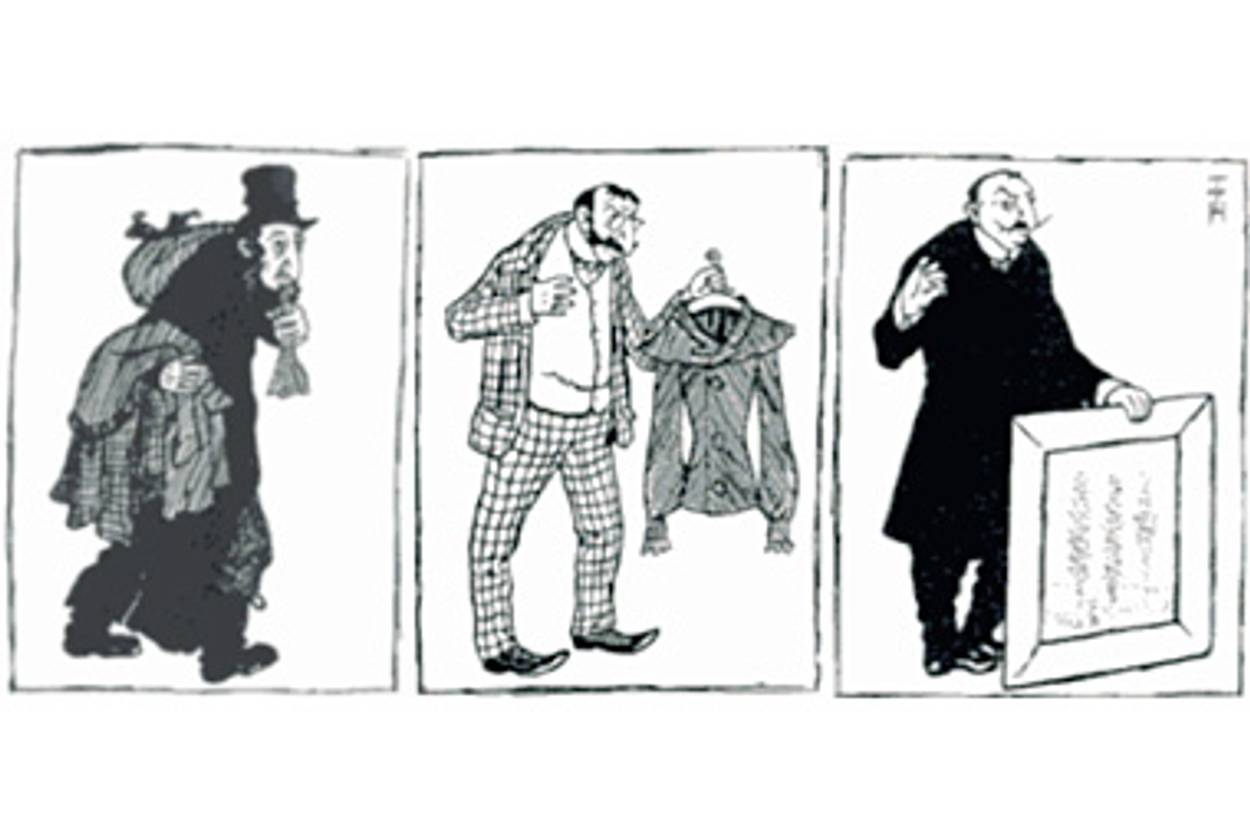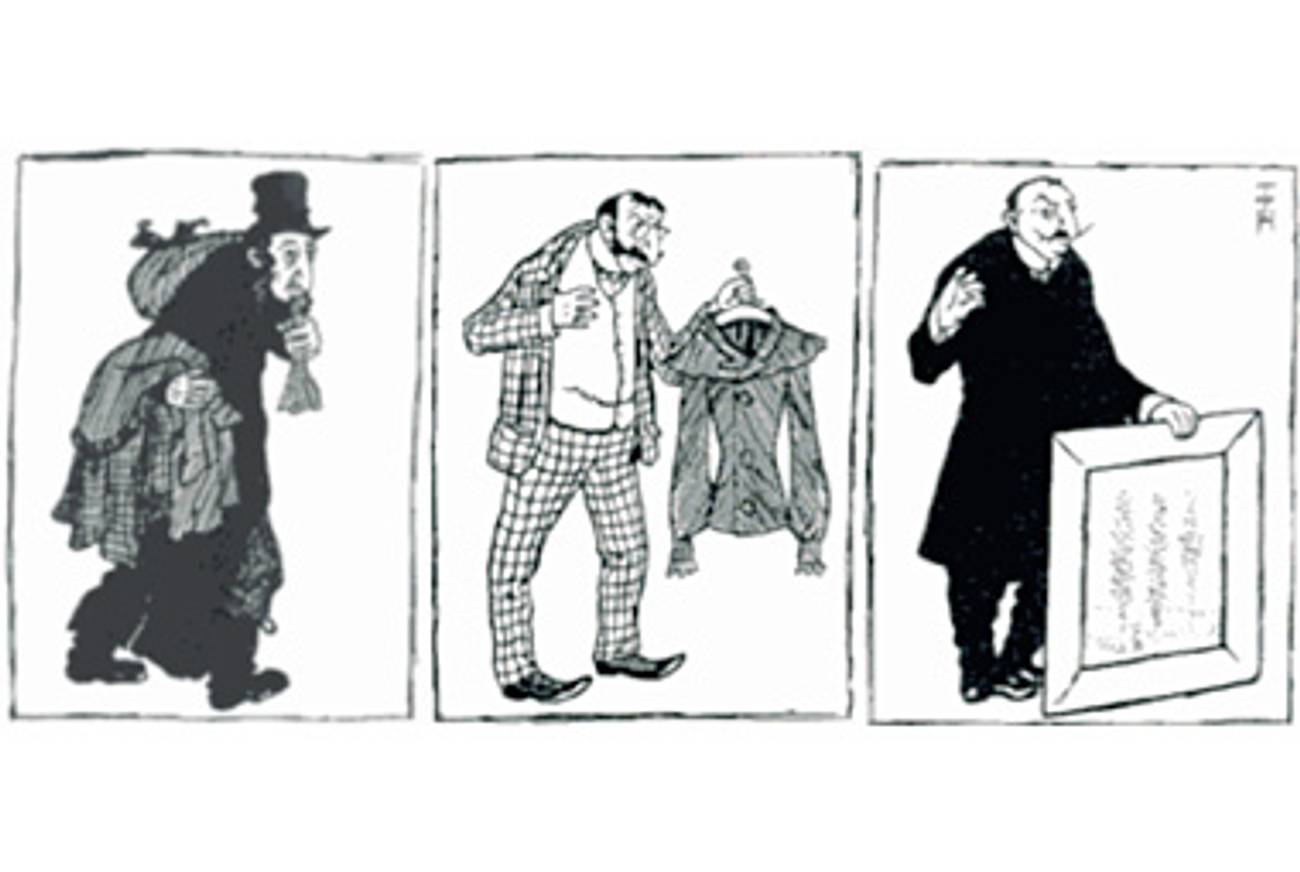Dark Humor
A collection of old world Jewish jokes feels a little funny




Earlier this year, New York magazine ran a cover story announcing the death of Jewish humor. “Twilight of the Tummlers” was a profile of Woody Allen and Larry David, tied to the movie Whatever Works, but it was also a prediction that their particular brand of bleak, self-lacerating comedy was not long for this world. The reason is that life for the Jews, in America at least, has simply become too good for Jewish jokes to be needed any longer. As the writer, Mark Harris, put it, “If that kind of humor is vanishing, the reason may be that it emerged from a combination of pain and pride that now seems more historical than contemporary.” Mel Brooks in The Producers, making lunatic, blasphemous fun of the Nazis, or Allen in Annie Hall, finding anti-Semitic innuendos in every stray comment (“No, not did you eat, but Jew eat? Jew. You get it? Jew eat?”), were the manic and depressive poles of Jewish alienation. But assimilation has worked like Prozac, leveling out Jewish moods into a happy, unfunny medium.
At such a cultural moment, Is It Good for the Jews?, the new book of comic stories by the Franco-Hungarian writer Adam Biro, cannot help striking an American reader as anachronistic and uncomfortable, in much the same way that, in one of Biro’s tales, a visiting Eastern European Jew strikes his British cousin. “Everything on Uberhohem screamed of the East: the cut of the suit, the material, the suitcase, the manner of carrying his coat, the way of moving, of speaking, of looking for his cousin, the articulate exclamation when the latter let himself be known by a discreet hand gesture,” Biro writes.
So, too, with the classic Jewish jokes that Biro retells in these short, chatty pieces. They come from a time and place—the Old Country, or the first generation in the New—when a Jew could no more hope to fit in with non-Jews than Uberhohem could pass for an Englishman. That is, in fact, the whole point of this particular story, in which Uberhohem visits his rich, successful, ultra-Anglicized cousin, Hajsvasser. Seeing Hajsvasser’s English clothes and house and wife, the poor cousin asks, “Tell me, Salomon, are you happy?” To which the assimilated Jew replies: “Isi, you’re asking me if I’m happy? How could I be, when we’re about to lose India?”
The joke here, as always in this genre, is on the Jew who forgets, or pretends to forget, that he is a Jew. Hajsvasser ignores the second part of the old maxim, “Dress British, think Yiddish”; by thinking British, he becomes the worst kind of fool, the one who fools himself. Not for nothing does Biro give the gauche immigrant Jew a Yiddish name that means, roughly, “super-smart,” while the slick assimilated Jew is called “hot water.” Hot water is exactly what awaits a Jew who doesn’t remember just where he stands with the gentiles.
Reading jokes like these—and Biro retells many old chestnuts, from the Jew who is granted three wishes by Napoleon to the Jew who tries to sneak into Yom Kippur services without a ticket—allows us to see them historically, to measure the classic style of Jewish humor against its later developments. It’s striking, for instance, that the joke from Annie Hall is a dialectical response to the “we’re about to lose India” joke. Hajswasser is funny because he believes, falsely, that Jews can fit in with non-Jews; Alvy Singer is funny because he believes, falsely, that Jews can’t fit in, that they always have to be on the alert for anti-Semitism. And if the New York magazine thesis is true, even that level of self-consciousness is no longer available to American Jews.
The difference between the Biro joke and the Allen joke is also related to the difference between the Jewish experience in Europe and America. To put it a little too simply: it is inherently funny for a Jew to become English, but it is quite normal for a Jew to become American. Try recasting the India joke in American terms—say, by having Hajswasser sigh, “How can I be, when we’re losing in Vietnam?” That wouldn’t be funny at all; in fact, the very suggestion that American Jews had no stake in America’s wars would be offensive, not to mention nonsensical (think of how many Jews were prominent in the Vietnam debate, from Henry Kissinger to Abbie Hoffman).
Reading Biro’s versions of these jokes, however, complicates the subject of Jewish humor in an unexpected and suggestive way. For Biro is not simply compiling jokes, like a folklorist. He is retelling them in his own voice, taking every opportunity to embroider, reflect, and talk about his own life. “‘My style and my spirit are both wanderers,’ said my friend Montaigne, my best friend. My anecdotes are pretexts,” Biro tells us early on.
And Biro, a Hungarian-born Jew who moved to Paris as a teenager and writes in French, inhabits a Jewish world doubly estranged from that of the post-ironic American Jew. When he writes about Kohn and Grun—the protagonists of Hungarian Jewish jokes, “Laurel and Hardy’s soul brothers”—it is with the constant awareness that the real Kohns and Gruns, his relatives, were wiped out, within living memory. Even when Biro is lounging at a café in Paris, the shadow falls:
“I am like everybody else, glucklich wie Gott in Frankreich, happy as God in France, happy as a lark, in love with Paris, with the cafes, with lovers…. But you might tell me that the French are anti-Semites, you who have the ex-tra-or-dinary luck to live in this city. It’s true, but not for all of them, and they are not just that. And then: they are no more anti-Semitic than, unfortunately, I am assuming, all the other nations in the world.”
In other words, Biro lives a kind of Jewishness not far removed from that of the jokes he is telling—a Jewishness under constant threat, always aware of difference, always warning itself against getting too comfortable. The problem is that he is not, like the original folk authors of Jewish jokes, telling those jokes to other Jews. He is writing them up, in a self-consciously literary way, for a French (and worldwide) audience—which is to say, on his own telling, for an audience of anti-Semites. And it is well known that jokes that can be told “among ourselves”—whether “we” are Jewish, black, Irish, or any other distinctive and beleaguered group—cannot be told to outsiders, who listen without sympathy, who won’t understand the assumptions and exaggerations.
This leaves Biro in a defensive stance, and defensiveness is not funny. Under the title “Of Strength (of Conviction),” Biro tells a joke about a bartender who bets customers $100 that no one can get a single drop from a lemon he has squeezed. Bodybuilders and tough guys take the bet and lose; then a scrawny fellow grabs the lemon and squeezes six more drops from it. Amazed, the bartender asks, “Who are you sir? What is your profession that it gives you so much strength? How were you able to extract several drops from a totally dry lemon?” To which the man responds, “I am a fundraiser for the United Jewish Appeal.”
I think that any Jewish audience would not only get the joke but find it rather flattering. After all, the resourcefulness of Jewish fundraisers is a reflection of the high value Jews place on philanthropy. Really, this is a joke about the compelling power of tzedaka as a Jewish ideal, so powerful that it can even force the selfish or indifferent to give. Yet here is how Biro introduces his telling:
“The birth of this text provoked a heated discussion with Karin [Biro’s wife]. She felt that it was clearly and openly anti-Semitic. It shows Jews that are greedy, for whom money comes before anything else…. However … exaggeration, the over-the-top comic charge, prevents the story from being taken seriously, from being seen as anti-Semite [sic: the translation, by Catherine Tihanyi, is not always successful in de-Gallicizing Biro’s prose]. True, the stories do feature some negative aspects of Jews, but always with indulgence, and these aspects are counterbalanced with positive ones…. Almost all jokes, whether they be Jewish or not, play on the opposition between several subjects, and, most of the time, these form a duality.”
And so on, in a way that not only kills any impulse to laugh but obscures what is genuinely, intimately Jewish about the joke. (“We laugh whether the story is about Jews, Corsicans, or Belgians, and this without an ounce of meanness,” Biro writes.) Perhaps the lesson of Is It Good for the Jews? is that, if you are genuinely worried about a joke being good for the Jews, you shouldn’t tell it.
Adam Kirsch is a contributing editor to Tablet Magazine and the author of Benjamin Disraeli, a biography in the Nextbook Press Jewish Encounters book series.
Adam Kirsch is a poet and literary critic, whose books include The People and the Books: 18 Classics of Jewish Literature.
Adam Kirsch is a poet and literary critic, whose books include The People and the Books: 18 Classics of Jewish Literature.